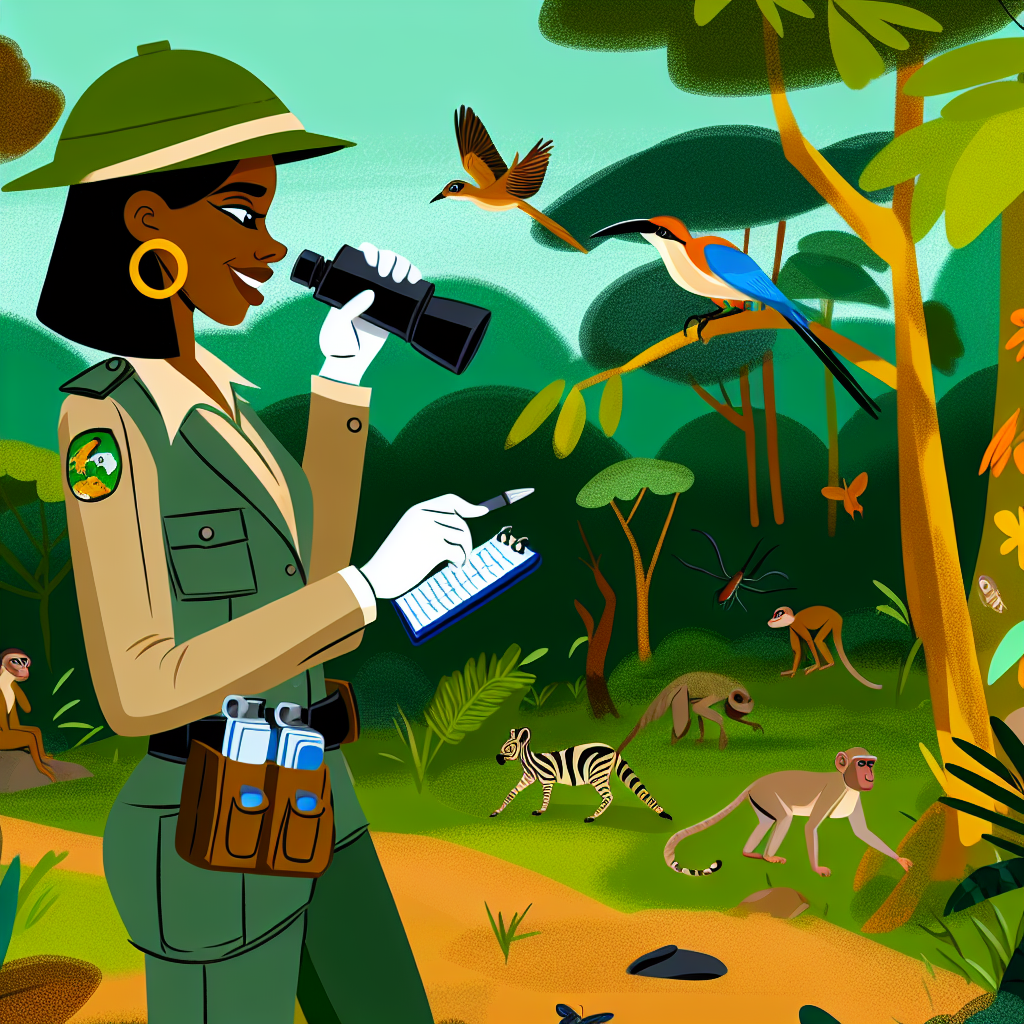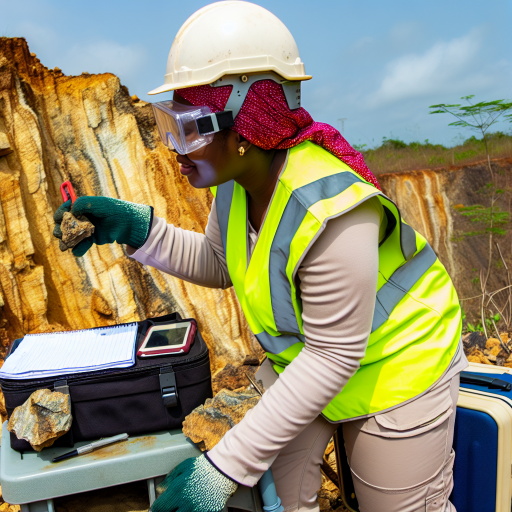Introduction:
Environmental conservation is crucial in Nigeria’s sustainable development.
Zoology plays a vital role in understanding and preserving Nigeria’s biodiversity.
Zoology, the study of animals and their habitats, provides valuable insights into Nigeria’s diverse ecosystems.
Through research and fieldwork, zoologists identify endangered species and develop conservation strategies.
These efforts help protect Nigeria’s unique flora and fauna from threats like habitat destruction and climate change.
By studying animal behavior and population dynamics, zoologists can assess the health of ecosystems and predict potential challenges.
This data is crucial for policymakers and conservationists to make informed decisions about land use and wildlife management.
Zoologists also play a key role in wildlife rehabilitation and conservation education programs, raising awareness about the importance of biodiversity conservation.
Through collaboration with government agencies, NGOs, and local communities, zoologists promote sustainable practices that balance environmental protection with economic development.
By engaging with stakeholders at all levels, zoologists help bridge the gap between conservation efforts and societal needs.
Ultimately, the work of zoologists is essential for ensuring a healthy and thriving environment for future generations in Nigeria.
The field of zoology is indispensable in Nigeria’s environmental conservation efforts.
By studying and safeguarding the country’s rich biodiversity, zoologists contribute to a more sustainable and resilient ecosystem.
Through research, education, and advocacy, zoologists play a critical role in preserving Nigeria’s natural heritage for years to come.
History and Evolution of Zoology in Nigeria:
Over the years, Zoology has played a crucial role in Nigeria’s environmental conservation efforts.
Let’s delve into the development and growth of Zoology as a field of study in the country, highlighting key milestones and contributions to environmental conservation.
Development of Zoology in Nigeria:
- Zoology in Nigeria traces its roots back to the early years of colonization by the British.
- Initially, the focus was on documenting the diverse flora and fauna of the region.
- As Nigeria gained independence, there was a shift towards studying the ecological relationships and conservation of wildlife.
- Universities and research institutions started offering specialized courses in Zoology to meet the growing demand.
Growth of Zoology in Nigeria:
- With advancements in technology and research methodologies, Zoology in Nigeria expanded rapidly.
- Scientists and conservationists began conducting field studies to gather valuable data on endangered species.
- Zoologists in Nigeria collaborated with international organizations to implement conservation programs effectively.
- The establishment of wildlife reserves and national parks provided a conducive environment for research and conservation efforts.
Key Milestones in Environmental Conservation:
- The creation of the Nigeria Conservation Foundation (NCF) in 1980 marked a significant milestone in environmental conservation in the country.
- NCF focused on protecting key ecosystems, conserving endangered species, and raising awareness about environmental issues.
- Zoologists in Nigeria played a crucial role in conducting research on endangered species such as the Nigerian elephant and pangolin.
- Collaborative efforts between Zoologists, government agencies, and local communities led to the successful rehabilitation of various wildlife populations.
Contributions of Zoology to Environmental Conservation:
- Zoologists in Nigeria have contributed valuable data on the biodiversity of the country, helping formulate conservation policies.
- Research studies on migration patterns of birds and marine species have provided insights for designing protected areas.
- Zoologists have worked on reintroduction programs for endangered species, restoring their populations in the wild.
- Public education and outreach programs by Zoologists have raised awareness about the importance of wildlife conservation and habitat protection.
Zoology has played a vital role in Nigeria’s environmental conservation efforts by studying wildlife, preserving habitats, and implementing conservation programs.
The field continues to evolve, with Zoologists actively contributing to safeguarding the country’s rich biodiversity for future generations.
Biodiversity Conservation:
Zoology plays a critical role in studying and preserving Nigeria’s diverse wildlife.
Research on various species helps in their protection.
Through zoological research and conservation efforts, specific endangered species in Nigeria have been protected from extinction.
Some examples of endangered species that have benefited include:
- The Nigerian Conservation Foundation (NCF) efforts in protecting the Cross River gorilla population.
- The conservation of the Nigerian chimpanzee population through behavioral and ecological studies.
- The protection of the African elephant population through population monitoring and conservation strategies.
- Efforts to conserve the Nigerian giraffe, facing habitat loss from human activities.
- Studying and safeguarding the critically endangered Nigerian pangolin from illegal wildlife trade.
- Conservation initiatives for the vulnerable Nigerian manatee based on distribution and habitat research.
By focusing on these examples, Nigeria can better understand its wildlife and implement effective conservation strategies.
Learn More: Professional Bodies for Geophysicists in Nigeria
Ecosystem Management
Zoologists play a crucial role in studying and managing ecosystems in Nigeria to ensure sustainability.
- By conducting research on different species and their interactions, zoologists gather valuable data.
- This data is essential for understanding the delicate balance within ecosystems and identifying potential threats.
- Through field observations and experiments, zoologists can assess the health of ecosystems and propose conservation measures.
- Zoologists also monitor changes in ecosystems over time, tracking population trends, and biodiversity levels.
The impact of zoological research on maintaining healthy and balanced ecosystems cannot be overstated.
- By studying the behavior and ecology of different species, zoologists can identify key factors affecting ecosystem health.
- This knowledge allows them to develop conservation strategies tailored to specific ecosystems and species.
- Zoological research also provides insights into the interdependence of species within ecosystems and the consequences of disrupting these relationships.
- Through their work, zoologists help policymakers and conservationists make informed decisions to protect and preserve ecosystems.
Explore Further: Advances in Environmental Microbiology in Nigeria
Wildlife Rehabilitation and Conservation:
Zoologists play a crucial role in rescuing and rehabilitating injured or displaced wildlife in Nigeria.
They work tirelessly to ensure that wildlife populations are protected and given the necessary care.
Zoologists collaborate with wildlife agencies and organizations to provide medical treatment and rehabilitation for injured animals.
They also rescue and relocate wildlife that may be in danger due to habitat destruction or human-wildlife conflict.
Success stories of Zoological efforts in conserving and protecting wildlife populations in Nigeria:
- The Nigerian Conservation Foundation has been instrumental in the protection of endangered species such as the Nigerian Giraffe.
- Zoologists have successfully rehabilitated orphaned elephants and released them back into the wild in Yankari Game Reserve.
- The Wildlife Conservation Society of Nigeria has made significant strides in the protection of marine turtles along the Nigerian coastline.
- Zoologists working in Cross River National Park have helped increase the population of the critically endangered Cross River Gorilla.
- The Afi Mountain Drill Ranch in Nigeria has rescued and rehabilitated numerous drills, a type of primate, back into the wild.
Zoologists in Nigeria play a vital role in wildlife rehabilitation and conservation efforts.
Their dedication and passion for protecting the environment and the diverse wildlife populations in the country are commendable.
Uncover the Details: Economic Impact of Boat Building in Nigeria

Sustainable Development
Zoology promotes sustainable development by studying ecosystems and biodiversity.
Zoological research provides valuable data for creating effective environmental policies in Nigeria.
By studying animal populations, zoologists help to identify key species for conservation.
Understanding animal behavior enables conservationists to implement more targeted conservation strategies.
Zoologists study the impact of human activities on wildlife populations and ecosystems.
This research helps policymakers make informed decisions to protect biodiversity in Nigeria.
Transform Your Career with Expert Guidance
Get personalized mentorship consulting that’s tailored to your unique path. Our expert advice is actionable and exclusive.
Get StartedThrough zoological research, scientists can recommend sustainable practices for agriculture and forestry.
Examples include promoting sustainable fishing practices and protecting endangered species.
Zoologists collaborate with government agencies to develop conservation programs and initiatives.
By studying animal habitats, zoologists contribute to land-use planning for sustainable development.
Zoology plays a crucial role in assessing the health of ecosystems and monitoring environmental changes.
Zoologists use their expertise to educate the public about the importance of conservation efforts.
You Might Also Like: Applied Math and Data Science: Connections
Public Awareness and Education:
One of the crucial roles of zoologists is to raise awareness about environmental issues in Nigeria.
Zoologists play a key role in educating the public about conservation efforts and the importance of preserving biodiversity.
By working closely with communities, zoologists help promote a culture of environmental stewardship and sustainability.
Through educational programs and outreach initiatives, zoologists engage with the public to foster a better understanding of local ecosystems.
They conduct workshops, seminars, and public talks to highlight the significance of protecting wildlife and natural habitats.
Zoologists utilize social media platforms and other forms of communication to reach a wider audience and advocate for conservation.
They collaborate with schools, universities, and other institutions to integrate environmental education into the curriculum.
Zoologists organize field trips and nature walks to provide hands-on learning experiences for students and community members.
By involving the public in conservation activities, zoologists empower individuals to take action and make a positive impact on the environment.
Through public awareness campaigns, zoologists inspire people to value and protect the rich biodiversity of Nigeria.
Zoology’s Importance in Environmental Conservation in Nigeria
Zoology plays a crucial role in Nigeria’s environmental conservation through research, education, and policy implementation.
Zoological studies help in understanding and protecting the diverse ecosystems and wildlife in Nigeria.
By studying animal behavior, population dynamics, and habitat requirements, zoologists can contribute to conservation efforts.
The data collected through zoological research can inform policymakers and aid in sustainable natural resource management.
Zoologists are essential in monitoring and mitigating threats to wildlife and their habitats, such as deforestation and poaching.
Through conservation breeding programs and reintroduction initiatives, zoologists can help restore endangered species in Nigeria.
Continued research and practices in zoology are vital for preserving Nigeria’s rich biodiversity for future generations.
The role of zoology in Nigeria’s environmental conservation cannot be understated, and its significance will only continue to grow over time.




